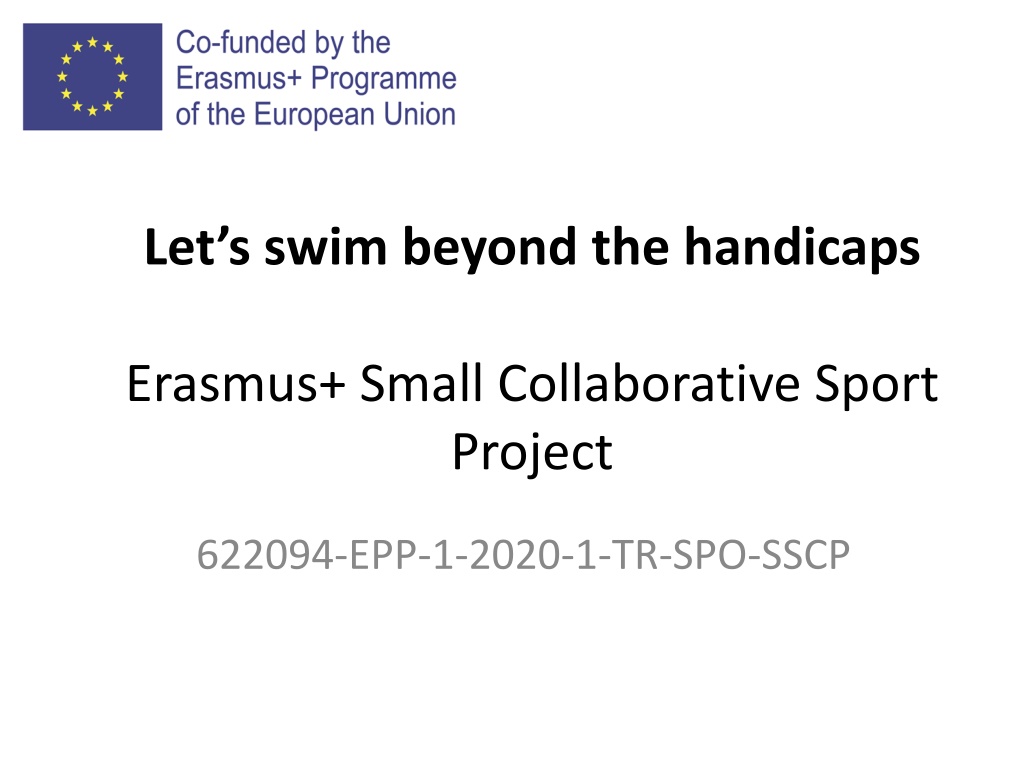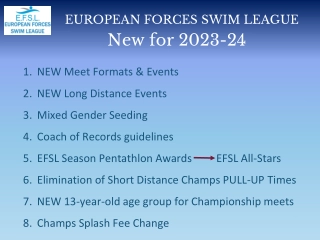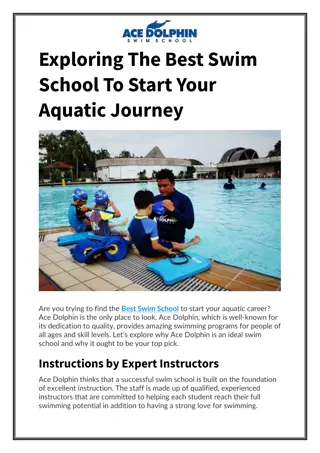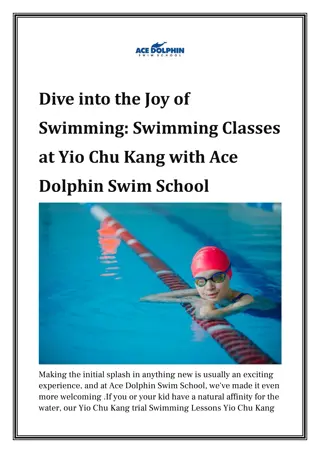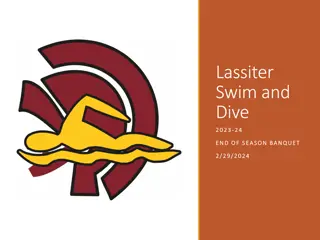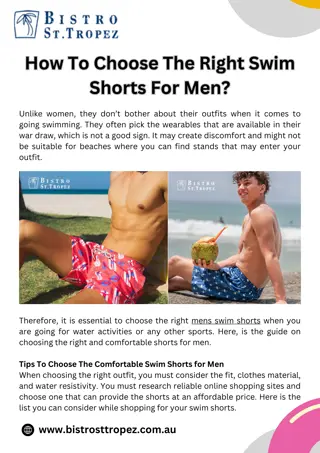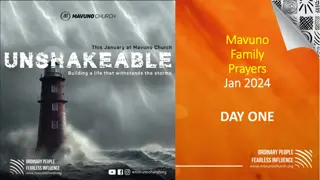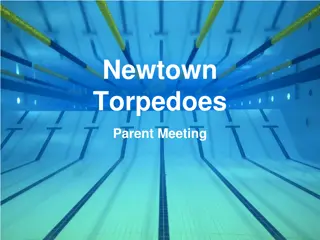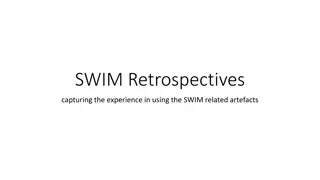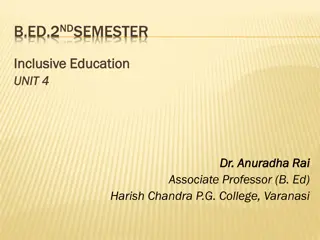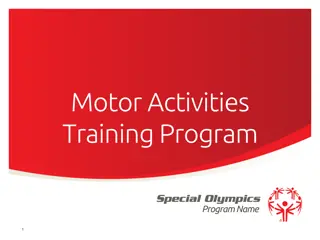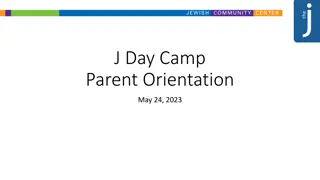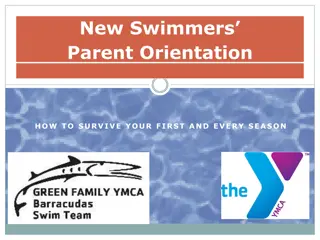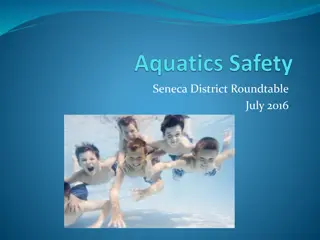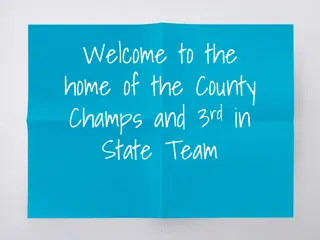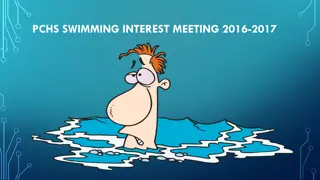Let’s swim beyond the handicaps
This collaborative sport project aims to include physically disabled kids in social life, improve the quality of their lives, and provide them with opportunities for social inclusion and skill development through swimming activities. Partnering with organizations from different countries, the project focuses on fostering relationships between disabled and non-disabled children aged 12-16, promoting active lifestyles, and organizing local and international tournaments. Project management, training courses, tournaments, and a final conference are among the activities planned over 12 months.
Download Presentation

Please find below an Image/Link to download the presentation.
The content on the website is provided AS IS for your information and personal use only. It may not be sold, licensed, or shared on other websites without obtaining consent from the author.If you encounter any issues during the download, it is possible that the publisher has removed the file from their server.
You are allowed to download the files provided on this website for personal or commercial use, subject to the condition that they are used lawfully. All files are the property of their respective owners.
The content on the website is provided AS IS for your information and personal use only. It may not be sold, licensed, or shared on other websites without obtaining consent from the author.
E N D
Presentation Transcript
Lets swim beyond the handicaps Erasmus+ Small Collaborative Sport Project 622094-EPP-1-2020-1-TR-SPO-SSCP
Coordinator: Karasu Kaymakamligi (Karasu District Governorship)- TURKEY Partners: Bulgarian Sports Development Association (BSDA)- BULGARIA Rijeka Sport association for persons with disabilities (SSOI Rijeka)- CROATIA Sport and Recreation Association for the Disabled Kinitiko Ergastiri (KINITIKO ERGASTIRI)- GREECE Karasu Youth, Art and Sport Club (KARGENC CLUB)- TURKEY
Duration: 12 Months Granted: 55.775 Target groups: Physical disabled kids and non-disabled kids aged 12-16 (6 physically disabled children and 6 non- disabled children from each partner country) Aim: to include physical disabled kids in social life, to improve quality of their lives, to grow them up together with their peers, to make them discover their skills, and to create a different environment where they can feel free to do exercise.
By using swimming pool, we want physically disabled kids aged 12-16 to come together with non-disabled ones aged 12-16. Swimming coaches, physical therapist, and a child psychologist will create different pair activities to be played in the pool. In the pool, one disabled and one non-disabled will be pair and they will have chance to do different activities together. Objectives: social inclusion of kids with disabilities To create activities to support the physical development of children with disabilities To make both kids with disabilities and without disabilities have an active life To weld kids with disabilities and without disabilities together
Project Design Project is divided in 4 work packages: WP1: Project management WP2: Traning Courses and Implementing Activities/ Organizing Local Tournament WP3. Organizing International Final Tournament Between Partner Countries WP4: Final Conference and Analyses of the Results WP5: Dissemination and visibility
WP.1 Project Management Every month will be held skype meetings to follow the project progress. Every partner s project team will consists of 2 members (one swimming coach and one project manager). Each project partner will have responsibilities to implement the project, and then to share and disseminate the project results and indicators. The coordinator s project team will consists of 4 members (one physical therapist, one child psychiatry, one project assistant, and one project manager). Applicant team will follow every steps and check them, and perapare necessary surveys to implement kids. Coordinator: - Following every local activities and keeping reports related with the implemented activities; - Providing physical therapist and child psychologist for the project activities development and implementation of the activities. - Preparing project booklet from the developed activities
The partners will be responsible: To following the management plan To create a project team (one manager, one swimming coach) To develop pool activities/ games for the target group To apply the activities in local area, to arrange a pool for the implementation, to define the target group, to take the records during the implementation for the analysises of physical therapist and child psychologist , Managing the project activities according to defined plans, To take necessary measures for the safety of the kids at the pool during the pool activities (such as having a lifeguard, supporting swimming board, swimming wheel (supporters for the kids) To keep the project implementation at least 8 hours at total (once a week for one hour) , then organizing a local tournaments, To provide the visibility and dissemination of the project in the local area, To take necessary permission from the families and have signed agreements between partners and the families Communication between all partners will be regularly carried out in order to exchange experiences, discuss time frame, methodology of implementation of the activities, and to report the disabled kids activities to the physical therapist and child psychiatry. Means of communication will be e-mails, video conference, whatsapp, skype, and phone calls.
Meeting Plan KOM will be held in Bulgaria. The 2nd Transnational project meeting to develop activities for the target group (Traning Course and Activitiy Development), will be held in Greece The 3rd Transnational project meeting (Youth Exchange and an International Tournaments), will be held in Croatia The 4thTransnational project meeting (Final Conference) will be done in Turkey in order to share the results and analysis of the project and to share the feelings and thoughts of the participants in the project.
WP2: Training Courses and Implementing Activities, Organizing local tournaments (1st TPM) The selection of the taget group will be done until the second meeting by the partners. Every partner s project team will consist of one swimming coach and one project manager. The coordinator s project team will consist of one physical therapist, one child psychiatry, one project manager and one assistant. Also, until second meeting, every partner will make a search about the pool activities for the target group and share this information on project drive folder; which will provide collecting the ideas in a common place. During the meeting for training course, every project team will give information about their own target (especially) disabled and non- disabled group and they will share their abilities. Swimming coaches, physical therapist, and child psychologist will share their ideas to develop activities and games for their target disabled and non-disabled kids.
Project teams will develop the activities/games to be played as a pair (one disabled and one non-disabled); so all activities can be implemented as a pair to create a common atmosphere for both disabled and non-disabled children. Physical therapist and child psychologist will provide information about how these kids can feel, which abilities can do, which activities provide their physical and mental development, how these kids can cooperate more with each other, and how they can raise empathy. Project teams will have decision on several activities/games to be played/done as pair at the pool. After decision on the activities/games, every partner will implement these activities in their region once a week for one hour during the project. The implementation should be at least 8 hours (two months). When they start to the activities at pool, swimming coaches will take some records how kids move in the pool to share with the physical therapist and child psychiatry(from the beginning to the end of the project). Regularly, all pairs will meet once a week for one hour. After all pairs learn all the games/activities, swimming coach organize a local tournament for these pairs. The top three pairs at the tournament will attend the next international tournaments among all partner countries in the project. During the whole pool activities, necessary safety measures will be taken every partner such as lifeguard, some equipments to support swimming (swimming boards, swimming wheels)
WP3. Organizing International Final Tournament Among Partner Countries (2nd TPM) It will be two days meeting for Final Tournament Among Partner Countries in Croatia. The first day of the meeting, there will experience sharing presentations. Every partner will share their experiences what they have done for now. They will present their presentations about their project activities and their local tournaments. They will share their interviews which will have done with their own participants. The second day of the project, tournament will be carried out with the participation of 12 mixed pairs with 4 swimming coaches in Croatia.
WP4: Final Conference and Analyses of the Results Final conference will take one day in Turkey and the coordinator will organize it. There will be 2 participants from each partner: one swimming coach, one project manager, in total 8 participants. KARGENC CLUB will attend the conference with all its target group in the project (6 disabled-6 non-disabled kids.) Every partner will present their associations and their project activities. Then, the children will share their experiences and thoughts during the project. At the end, physical therapist and child psychologist will present the the analyses of the effects and advantages of the project. Stakeholders such as directorate of national education, directorate of youth and sport department, sport clubs, and several PE teachers will be invited for the final conference. Members of the participants: Croatia: 1 swimming coach, 1 project manager Bulgaria: 1 swimming coach, 1 project manager Greece: 1 swimming coach, 1 project manager KARGENC CLUB: 1 swimming coach, 1 project manager, 6 disabled kids- 6 non-disabled kids KARASU DISTRICT GOVERNOR: 1 project coordinator, 1 project manager, 1 physical therapist, 1 child psychologist
Activity Plan Creating project team Creating of target group (6-6) Applying questionnaire All partners will conduct several surveys of self-confidence survey, developmental evaluation, fear of movement, the rate of social inclusion for disabled kids; survey of awareness about disability for non- disabled kids. Moreover, they will interview with the families in order to realize the thoughts of the families and their needs. These reseraches will show us the real situation and needs of disabled kids. Also, the implementation process will be followed by the coordinator and project managers, and child psychologist and physical therapist will analyze the effect of the project. At the end of the project, analysis results will be published as academic articles. - what activities disabled kids can do - what activities disabled kids can do with their non-disabled kids - what thought and feelings their families have, - how much they have the feeling of self-confidence and the fear of movement - how much they can be included in social life - the evaluation of their physical development - what thoughts of non-disabled kids have about their disabled kids and what their awareness is about this issue. Data collection for the pool activities
1st TPM in Greece Preparing Booklet by the coordinator Local activities (at least 8 hours in two months) - Taking records - Organizing tournaments - nterview with kids 2nd TPM in Croatia - Final Tournament Final Conferance in Turkey
WP5: Dissemination and visibility The project will be promoted through different social media channels: Web sites Facebook, Twitter, Instagram, YouTube Local newspapers Press conference Public portals Media newspaper Active accounts Promotional materials will be prepared and translated as following: Printed booklets: 4x 100 Project posters: 4 x 50 Invitation cards 4x 200 5 Project penguins 1 Banner 75x300cm 100 Project t-shirts, hats, goggles and swimming caps, 96 certificates of attendance, Logo, slogan - Electronic - Creation of 1 project logo and slogan
The project coordinator and all the partners will start to disseminate the project on social media as soon as approved the proposal. By the kick-off meeting, all the partners will start to identify the project on their social media and web sites. The coordinator will create a facebook page for the disseminate every steps of the project. Also, a hashtag will be defined by all the partners for all sharings on social media (twitter, Instagram, facebook) After the first meeting, all partners will keep disseminating and sharing on social media the activities which will have carried out in their region step by step; also, they will report their activities to the project coordinator. All sharings will be done by the defined hashtag. Activities will be developed by all the partners and these developed activities will pe printed on a booklet to distribute. Also, the booklet will be posted as online platforms. The activities will be shared on the project Facebook group as well. A video for their tournaments and activities will be created by all partners to share at the final tournament and final meeting of the project and then to share on social media and web sites after the project. A manifestation will be created for the final meeting with all the partners by the coordinator. A project film will be created at the end by the coordinator and it will be shared on social media, web-sites of the organization, and with sport clubs and schools. The results of the project will be analysed and be reported as articles by child psychologist and physical therapist. The article will be presented to the institutions who work with disabled kids.
Results: 1 press conference, 1 Final Conference 2 meetings in regional sports councils (with participation of physical education teachers or coaches, representatives of associations, sports department representative, education department representative and municipality representative) 2 published articles about the results and effect of the project 1 banners (at the international tournament in Turkey) 10 press release online or in printed newspapers (2 in Croatia, 2 in Bulgaria, 2 in Greece, and 4 in Turkey) 4 project panels (project panel at least 1 school in each country) 100 hats, t-shirts, and goggles, swimming caps,
